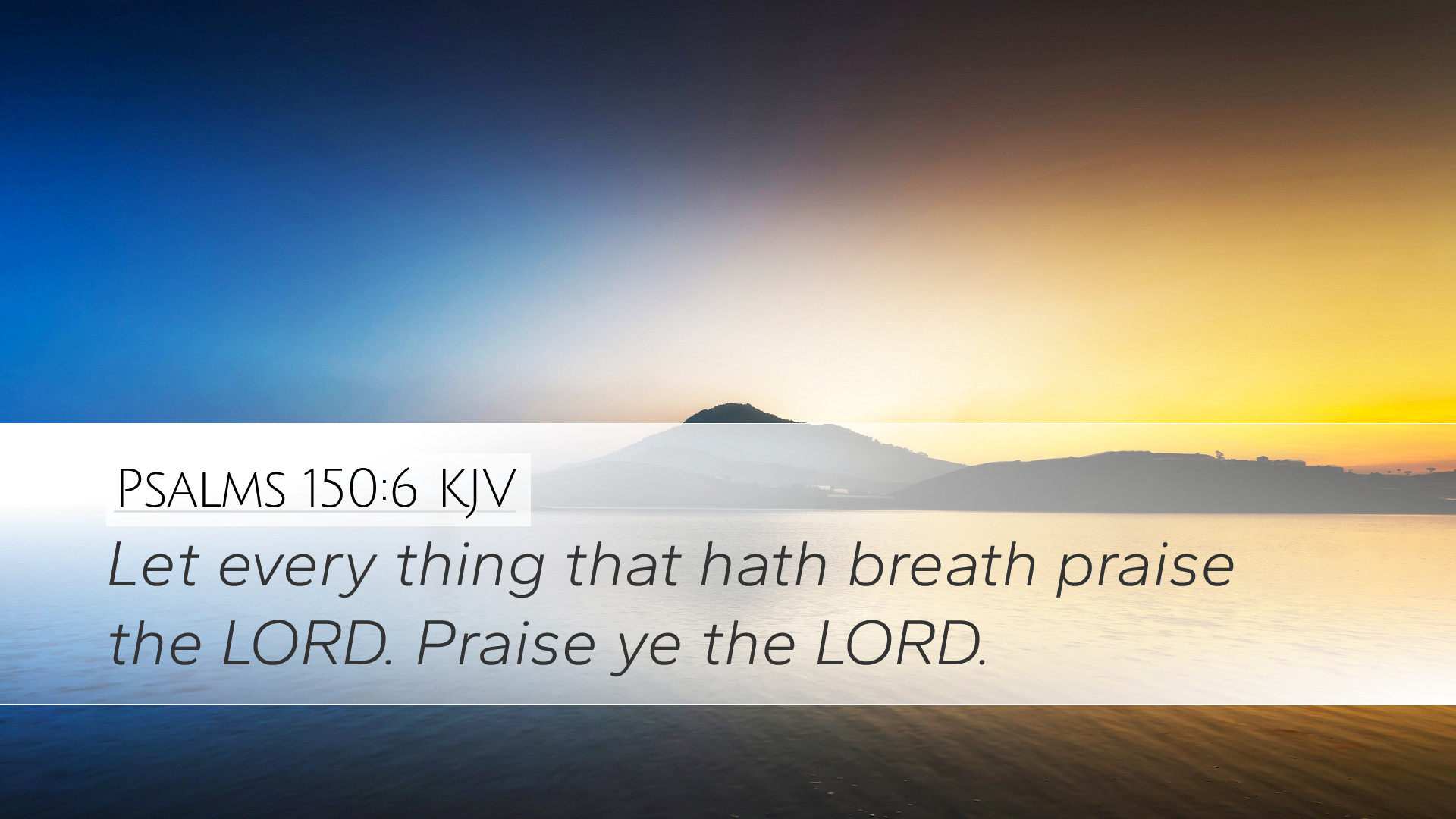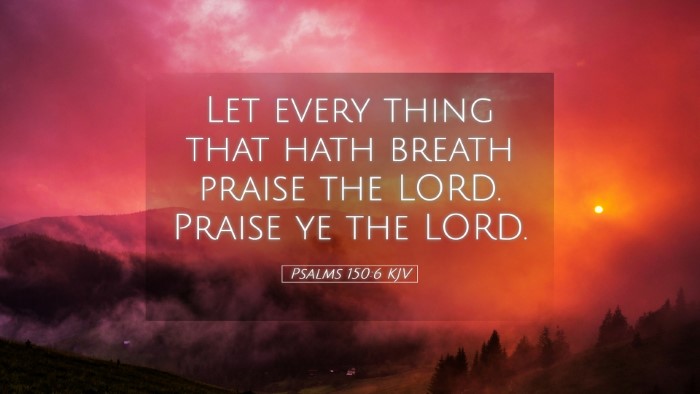Commentary on Psalms 150:6
Verse Text: "Let everything that has breath praise the LORD! Praise the LORD!"
Introduction
The final verse of the Book of Psalms serves as a robust conclusion to the entire Psalter. Psalm 150 is a psalm of praise, emphasizing the importance and necessity of worshiping God. As we delve into various commentaries, we uncover profound insights that offer a richer understanding of this verse.
Matthew Henry's Commentary
Matthew Henry emphasizes the universal call to worship present in Psalms 150:6. His perspective highlights:
- The Inclusivity of Worship: Henry notes that every living being is called to praise the Lord. He states that this is not a call limited to Israel but extends to all of creation. The phrase "everything that has breath" encompasses not just humans but every creature, illustrating God’s sovereignty over all life.
- The Essence of Praise: He also posits that to have breath is to have a duty to praise God, as breath itself is a gift from Him. The very act of breathing should be an act of worship, making life a continuous expression of gratitude to the Creator.
- Finality and Urgency: Henry regards this exhortation as a fitting final word in the Psalms, indicating that praise should be constant and pervasive, compelling the believer to examine whether their life reflects such praise—or if it merely exists in words.
Albert Barnes' Commentary
Albert Barnes provides a systematic analysis of the verse with thoughts on the implications for both individuals and the congregation:
- A Universal Call: Barnes emphasizes that all mankind and creation are the subject of this call for praise. He asserts that it unifies all beings under one purpose: to glorify God. This is a significant theological point that speaks to the omnipotence and omnipresence of God.
- Praise as an Obligation: The obligation to praise God is a key theme in Barnes’ work. He suggests that recognizing God’s greatness naturally leads to the expression of that knowledge through praise. Therefore, a failure to praise is seen as neglecting a fundamental component of one’s being.
- The Nature of True Praise: Barnes also discusses what constitutes true praise. It must be heartfelt, sincere, and rooted in an understanding of God’s worthiness. Such praise is not merely a ritual but a recognition of God’s role in the lives of believers.
Adam Clarke's Commentary
Adam Clarke presents a rich theological exploration of this verse, focusing particularly on its implications for worship practices:
- The Concept of Breath as Life: Clarke interprets "everything that has breath" as a reference to life itself and all its manifestations. This connection highlights that existence is intertwined with the act of praising God; without acknowledgment of Him, life is diminished.
- The Dynamic Nature of Praise: He contends that praise is not static; it evolves and encompasses numerous expressions ranging from verbal declarations to acts of service. The various forms of worship mentioned in the preceding verses set the stage for this closing exhortation to praise.
- The Culmination of the Psalms: Clarke points out that this verse acts as a conclusion to the themes addressed in the Psalms, encapsulating the essence of the entire book—worship and the glorification of God must be central to life.
Theological Insights
The verse acts as a bridge to understanding the broader theological implications present within the Psalter:
- The Sovereignty of God: "Let everything that has breath praise the LORD" indicates God's authority over all creation. This invokes a theological reflection on divine sovereignty and how it invites all creation into a relationship with Him.
- The Community of Praise: This verse calls for communal worship, as it brings together all breathers into one unified chorus of praise, suggesting that worship is an essential aspect of the community and collective identity of believers.
- The Purpose of Creation: The act of praising God is presented not merely as duty but as the very purpose of creation. Thus, humanity's ultimate fulfillment lies in aligning their lives with this divine call to glorify God.
Application for Pastors and Theologians
The commentary on Psalms 150:6 provides a wealth of application for pastors and theologians:
- Encouragement in Worship: Encouraging congregations to recognize their roles as praisers of God is essential. Leaders must foster environments where worship is a natural response to the recognition of God’s nature and deeds.
- Educational Approaches: Teaching about the importance of praise in all aspects of life helps deepen the congregational understanding of worship beyond mere rituals. This verse can inform worship seminars, Bible studies, and preaching series.
- Missional Implications: As this verse extends a call to all creation, it provides a missional framework. It serves as a reminder of the church's role in bringing others into this divine praise, emphasizing outreach and evangelism that highlight God's glory.
Conclusion
Psalms 150:6 stands as a clarion call for all creation to praise the Lord, encapsulating the purpose and essence of human existence. Through the insights garnered from the commentaries of Matthew Henry, Albert Barnes, and Adam Clarke, we glean a deeper understanding of what it means to engage in worship and the implications this has for both individual believers and the faith community at large.


